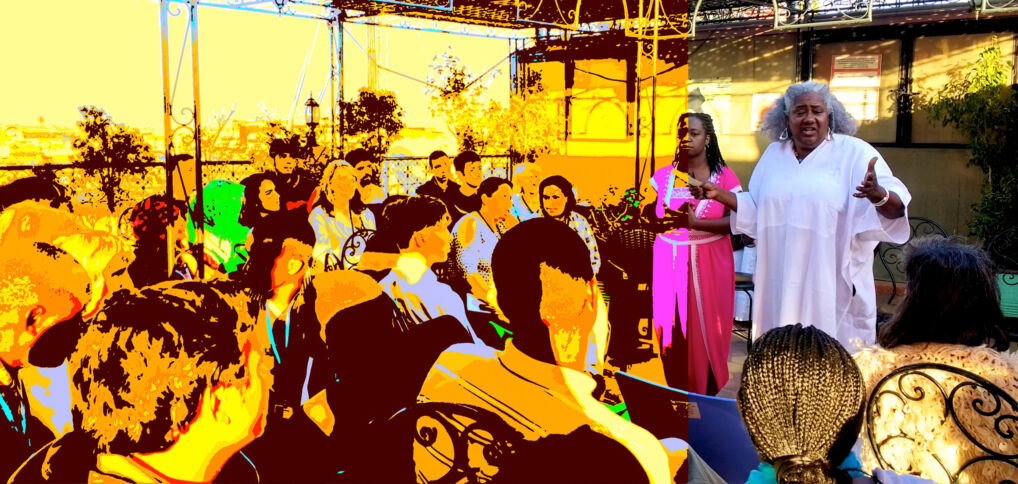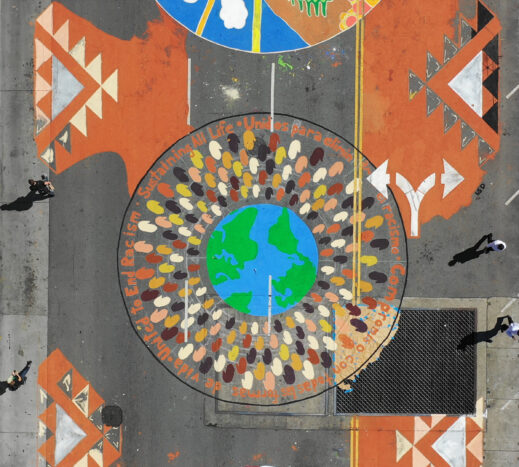
View this resource
in English (PDF) >>View this resource
in Arabic >>View this resource
in French >>
Racism damages everyone and separates all of us from each other. It shapes and perpetuates the inequities of our societies and has become a part of our societal institutions. It limits the access of the majority of the world’s population to the resources of society. Racism is maintained by violence, threats of violence, misinformation, lies, isolation, and greed. In the form of slavery, apartheid, and racial discrimination of many kinds, it has damaged or destroyed the lives of hundreds of millions of people.
Because of European-centric racism, the human-caused climate emergency and environmental destruction disproportionately impact Africans or African descendants, Indigenous people, Asians or Asian descendants, Pacific Islanders, Latinos/Latinas, Chicanos/Chicanas, Mestizos/Mestizas, Arabs or Arab descendants—Indigenous and Global Majority People.2 Also because of racism, the mainstream environmental movement in the globally dominant nations has been slow to redress this destruction and has marginalized or excluded the perspectives of people in these groups. This unaware and unchallenged racism has made the movement unwelcoming to these populations.

Although racism is aimed at particular sections of the population, it corrodes and corrupts the entire society— severely limiting the society’s progress, and the progress of every individual within the society, toward a full and meaningful life. Racism also limits the effectiveness of the environmental movement by limiting its focus and vision, and keeping it from being strong, diverse, and united. It blocks the development of the political will required in many nations to develop meaningful comprehensive climate policy.
To end racism, policies must change, racist behavior must stop, the injustices from racism must be redressed, and all people must recover from the damage done to them by racism. Healing the damage done to individuals by racism is not the same as ending racist policies, but only by healing this damage can we be confident that racist behaviors will not continue and that racist policies will not reappear in other guises.
To fully eliminate racism, we must heal three forms of damage:
1. The corruption of the minds and spirits of those who have been conditioned by society to be the agents of racism
2. The damage done to the people who have been targeted by racism
3. The damage to the oppressed groups’ attitude toward themselves, causing them to believe racist misinformation about themselves, other members of their group, and other groups of Indigenous and Global Majority People

All three forms of damage can be healed if people can be listened to well and supported to release their accumulated hurts. Doing this healing work frees people’s minds from the damage of racism and allows people to feel good about and value themselves. It can help people think about how racism is acted out in the environmental movement and the broader society, and how that can be addressed. It can help people understand how racism limits our thinking about climate policy. It can help people cooperate across lines of oppression and take action to set things right.
We all need to heal from the effects of racism to be able to create a united movement to end environmental degradation, the climate crisis, and restore the environment. This is not quick or easy work. Many of us resist emotional work. We may feel like there isn’t time. Or we may feel that we have been able to succeed in life only by not showing anyone how much we’ve been hurt. We may feel ashamed of or embarrassed by our feelings. We may have survived by numbing ourselves to the damage we carry and by assuming we will never be free of it. We may feel it would be unbearable to look at and to feel those feelings again. Perhaps this is because we have had no opportunity to tell our stories or have not been treated well when we have tried to tell them.
In Sustaining All Life we have learned that it is possible to heal the emotional harm from racism and internalized racism, and we offer tools to do this. Healing from the effects of racism is not a substitute for taking action to end institutional racism, but it is a vital part of the work to end racism. It is vital to becoming widely effective in the work to end the destruction of the environment.
1We define racism as the one-way, systematic, institutionalized oppression of people on the basis of skin color or the presumption of membership in particular racialized groups.
Indigenous peoples and the peoples of Africa, Asia, the Pacific Islands, the Caribbean, and Latin America, and those descended from them, are over eighty percent of the global population.These people also occupy most of the global land mass.
Using the term “Indigenous and Global Majority (IGM)” for these people acknowledges their majority status in the world and interrupts how the dominant (U.S. and European) culture assigns them a minority status.
Many Indigenous and Global Majority people living in dominant-culture countries have been assimilated into the dominant culture—by force, in order to survive, in seeking a better life for themselves and their families, or in pursuing the economic, political, or other inclusion of their communities. Calling these people “Indigenous and Global Majority” contradicts the assimilation.


